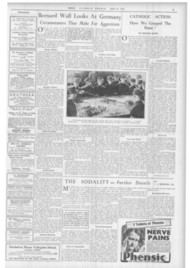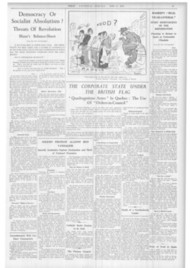Page 5, 11th June 1937
Page 5

Report an error
Noticed an error on this page?If you've noticed an error in this article please click here to report it.
Tags
Share
Related articles
Germany
Flash-back. To History
The Real Position T He Aggression In Korea Has Galvanised...
Bernard Wall Looks At Italy
Notes And Comments
Bernard Wall Looks At Germany
Circumstances
That Make
For Aggression
NE of the results of the Napoleonic wars was a growth of a nationalist spirit all over
the continent. But in spite of this Germany did not become a united Empire until the end of the Franco-Prussian war, and it was largely the creation of Bismarck.
The country we call Germany today had previously been composed of some hundreds of tiny principalities and several kingdoms, the most important of which were Prussia, and then Bavaria.
German Writers
At the end of the eighteenth century and during the Napoleonic wars Germany produced a great literature. It was the age of Cioethe and Schiller, and there was a huge awakening of poetry and thought. But most of the great German writers were not nationalist, and Goethe for instance was an ardent admirer of Napoleon. He did not care about Germany as one nation.
This lack of nationalist feeling amongst Germans is still very noticeable today.
The south Germans usually dislike the Prussians, and will often tell you that they prefer the Austrians and the Swiss. But at the same time it has had noticeable advantages. German cities are much more interesting than French or Engtish cities because for so long they were little capitals of their own, and all that went with local government: state theatres, literary life, pride in their magnificent architecture, and local culture.
Growth of Power
But the misfortunes which resulted from the lack of unity amongst Germans were similar to those Italians began to feel during the last century. Germany, being divided, was weak, and became one of the natural battle grounds of Europe between the great powers, France, England, Austria, Prussia and Russia. And the French had shown under Napoleon how it was impossible to resist the modern military state with the old cumbrous machinery of easygoing monarchies and princedoms.
So during the last part of the last century and the beginning of this Germany was becoming a modern state like France and England. Berlin grew enormously in size and overshadowed other cities as London and Paris had done. And efforts were made to weaken the hold of Catholicism over the country—the new Germany was two-thirds Protestant and onethird Catholic—so as to break down the religious disunity between Germans. The Kulturkampf idea of Bismarck failed owing to the strength of the German Catholics, but it has revived again today.
Neeci of Colonies It is important to notice that the process of breaking down local barriers and making a united state had happened in France and England much earlier, with the Reformation in England, and with Louis XIV and the Revolution in France.
The Germans, therefore, like the Italians, found that when they were powerful enough to challenge the age-long supremacy of the other nations. most of the world's goods had already been seized. The Germans were more aggressive in tone than the French before the Great War but the French had already had their fling with the Napoleonic wars,
The Germans felt they were a far more numerous people and more progressive than the French, and that destiny had decided they should be the paramount people in Europe. They also believed that German culture was superior to French, that it was regenerate while the French was decadent.
Sentimentalists
The French tend to be rationalists, individualists: the Germans on the contrary tend to be mystical, panetheist, and sentimental.
The Germans have not the same sense of an individual's rights as the French, and they are not jealous of the slightest interference with what the English call " the liberty of the subject " and the French " the rights of the individual." In their neglect of the individual and their emphasis on the mass, which they often incline to see in a mystical light, they resemble the Russians much more than they resemble Western Europeans. Music is as natural an expression of the best German soul as criticism is of the French.
The Germans cannot accept Aristotelian logic. for instance. as easily as the French, and it is worth noticing in this context that the progress of the neo-Thomist movement has been much slower in Germany than in other countries.
French culture and French ideas are usually instinctively disliked by Germans, who consider them superficial and lacking in profundity — while French people usually view French culture as the only form of culture and despise German culture as "barbarous."
The Germans when they look at French politics think the French are dirty, disorganised and decadent: the French. when they look at Germany think of the country as unfree, lacking political sense and above all common sense. These judgments are so widely spread that even the most intelligent people in either country can rarely talk sense about the other.
• Inhuman Mysticism The decline of Christianity in the various European countries has brought national psychology into greater prominence, and has helped to produce philosophies of life worked out in terms of each nation's particular characteristics.
Just as post-Christian France has developed a destructive rationalism, so postChristian Germany has developed an inhuman mysticism. When Christianity ceased to be the leading cultural influence in Germany, the way for the new racism was open. To the French and the English the new Hitlerite movement seems like an abdication of the intelligence. But in Germany it is seen as the highest development of the philosophy of race and con quest, the corner stone of the thought which Germany was-preparing for the world in the nineteenth century. The Germans throw a huge emphasis on the moral ideal of manhood, on a simple tribal code of courage and honesty and fellowship, which they 'view as a rebirth from the stuffy unhealthiness of the French. Hence all this talk about " blood and the soil."
Collapse Improbable
People outside Germany who watch German affairs are always hoping that the present regime will collapse owing to the discontent of large masses of German opinion. But in this, I think, they are blinding themselves to German history and the German character. No form of state is less unsuited to the German people than the democratic form. It was a foreign importation after the Great War, and it was largely preserved with the force of foreign bayonets.
The overwhelming mass of the German people is behind Hitler, not only because he is carrying out even more completely than the Prussian Empire the work of unification of Germany, but also because the Germans feel once again that they can enjoy their sense of discipline and obedience, their sense of being " a brotherhood in arms," the corn
radeship which soldiers have, and the heroic ideal of life which, they feel, can find no expression in the bartering of the League of Nations.
Now in many senses German culture has deep funds of life lacking in other countries, and Germany has a contribution to make to our common fund which we can only neglect at our peril. The misfortune of Germany lies in the collapse of our common western Christian tradition which had in its ideals (noticeably the ideal of chivalry) in which Germanic heroism could be realised without doing violence to our civilisation.
Pureness of the South The highest development of German civilisation seems to me to be found not in the exaggerations of Prussianism, but in the more universal spirit of Austria and the South, not in Berlin so much as in Munich and Vienna where the people developed one of the highest types of civilised life which has ever existed on earth.
It is a serious misfortune for Europe that the inevitable unification of the German peoples came from the north rather than from the south. A Germany in which the I south played a predominant part would be much more in keeping with the German literary and artistic tradition than a Prussian Germany. And the paradox of this situation is that the Prussian domination has repeatedly been assured by the lack of foresight of French politicians and the lack of sympathy of the French people.
" Advanced " thought in France, England and America is inclined to excommunicate Germany from the world of progressive nations, and this unfortunately only makes the situation worse.
Germany, deprived of an equal place in the consortium of peoples, save on terms dictated by "democratic " civilisation, is bound to assert her superiority always more aggressively. This is partly the explanation of movements within the Hitlerite state. such as Ludendorff's new paganism, which turn against pretty well everything that Western culture stands for. The Franco-German struggle testifies more than almost anything to the debility of Europe, but most of the remedies proposed involve forcing one way of life on the other people, and hence are worse than useless, whichever way of life be preferred.
blog comments powered by Disqus
















